Let’s Try Something New
We’ve been thinking a lot lately about why we eat the foods we do. Sometimes it’s out of habit or convenience. We know how to make the dishes and the ingredients are readily available. I’d bet that’s true for most people. Every meal is not an event. Sometimes supper is just supper.
We started this blog to explore other foods and to have new and different experiences. Doing this “food journey” has opened up a new world of possibilities. The project has prompted us to try new recipes and, along the way, to learn something about other places and other cultures.
A good example is our recent experience preparing Hakka Salt-Baked Chicken.
This is a dish we might not ever have eaten, if we weren’t doing this project. It started when we got a nice, locally-raised chicken from our friends Jon & Melanie at Wiley-Bachmeyer Farm. Mary decided she wanted to do something special with it. “Why should I make Ina Garten’s chicken again?”, she asked. (This is not to disparage the Barefoot Contessa. We have enjoyed her “perfect” roast chicken recipe for many years.).
This is a dish we might not ever have eaten, if we weren’t doing this project. In Mimi Sheraton’s book “1,000 Foods To Eat Before You Die” – our
Guidebook”, Mary found an intriguing note about “salt-baked chicken” in the chapter on Chinese food (pp. 780-781). There was no recipe, but an Internet search turned up a recipe for “Hakka Salt-Baked Chicken” on the Food & Wine magazine web site.
This recipe was first posted in 1998. In 2018, Food and Wine named it one of their 40 best-ever recipes. That seemed a great place to start, but we were curious about “Hakka” – to what, where or whom did the name refer?
Who Are The Hakka?
We learned that the Hakka are Chinese who live in the Southeast of China, but who are also dispersed around the world. “Hakka” does not refer to a particular region. Depending on who is translating, it can mean “guest”, “nomad” or “migrant”. The exact origin of the name is lost to history, but it is widely accepted that the Hakka were originally northern Chinese who progressively migrated to the south because of war, invasions and social unrest. They were “migrant caravans” in the 5th and 10th centuries AD.
Despite their diaspora, Hakka Chinese have maintained their food traditions. Their food is hearty and sometimes heavy. One food writer said, “Hakka food is characterized as salty, fragrant, and umami. Rice, pork, tofu, and soy sauce are staples of the cuisine, while rice wine, ginger, garlic, and salt were used to preserve and flavor the food.”
Preparing the Bird
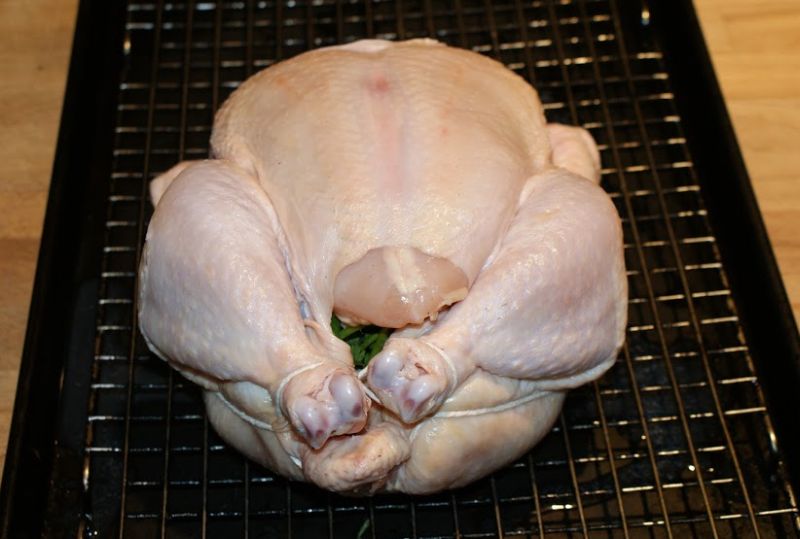
The chicken is stuffed with ginger, scallions, cilantro and star anise, then brushed with a liqueur. The recipe calls for Rose Dew, a Chinese liqueur, but that was not available locally so Mary substituted dry vermouth. The chicken is then allowed to stand in a cool, airy place for about two hours until the skin is dry and taut. (This is the same technique used to make the crispy skin on Peking Duck.) It was a cool winter day, so Mary set the chicken on a table outside on our porch. The only precaution needed was to bring the cats indoors.
The chicken is then trussed and wrapped in cheesecloth. Next you heat 4 ½ pounds of kosher salt (that’s right… 4 ½ pounds) in a heavy pan. When the salt is very hot, you pour out all but an inch. The trussed and wrapped chicken is placed in the pan and covered with the remaining salt. The pot is covered and left to cook on moderate heat for 1 ½ to 2 hours.
Once it was on the stove, we weren’t sure how it was going to turn out. After about 30 minutes, Mary lifted the lid on the pot and we could start to smell the chicken. After an hour and a half, the whole kitchen was filled with a luscious, nearly overpowering aroma – the kind that makes you hungrier by the minute as you wait impatiently for the kitchen timer to count down.
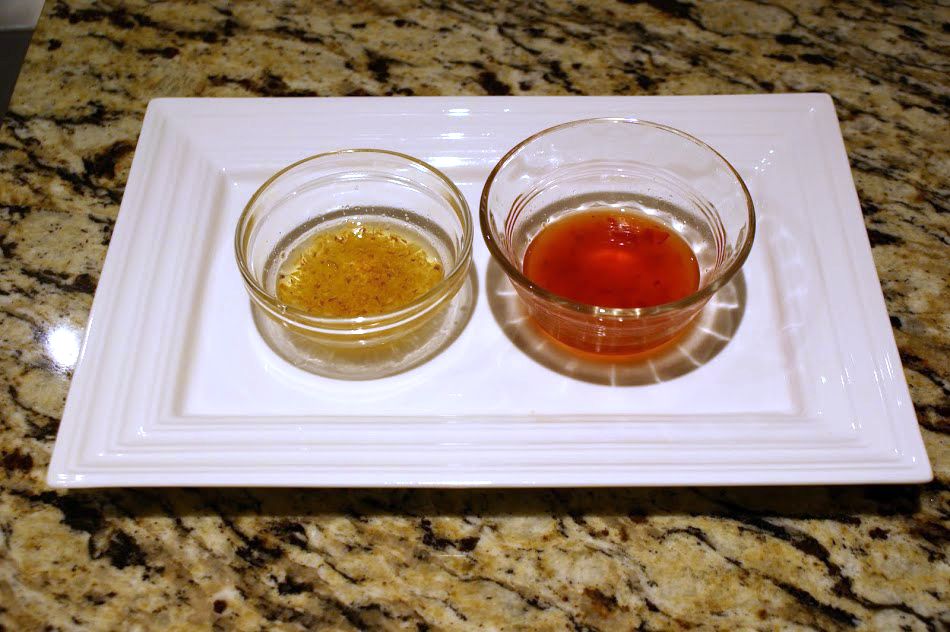
While the chicken was cooking, Mary made two dipping sauces – a Hakka Ginger Sauce and a Hakka Chile Sauce. The preparation of the ginger sauce is interesting. Oil is heated over medium-high heat until it just begins to smoke, then poured over finely chopped ginger. The heat from the oil cooks the ginger.
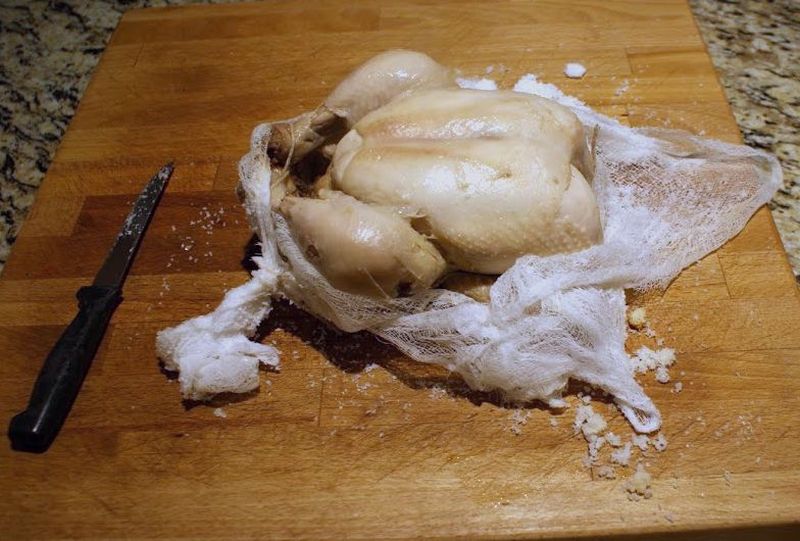
When the chicken is done, you crack open the salt crust and lift out the bird. Away from the stove, you remove the cheesecloth and the twine. Mimi says that “in the Cantonese tradition, the finished salt-roasted chicken is chopped with a cleaver into small nuggets – succulent meat, crunchy bones, crisp skin and all – to be dipped into ginger-zapped soy sauce.”
The Results Were Delicious!
We didn’t chop it up. Instead we carved off big pieces of meat that we tore apart and ate with our fingers.
The chicken was perfectly cooked – no pink inside. The meat was tender, moist and only a little salty.
The chile sauce was sweet, with a bit of heat, and reminded us of sauces we have had in restaurants. The ginger sauce was very mild and was a nice complement to the salty chicken. We preferred the ginger sauce and will make more the next time – we ran out!
We ate the chicken by itself, accompanied only by a nice Pinot Noir we’d been given last Christmas. And when we were done, we were happy. We had made a glorious mess of the kitchen, and all the table linens had to go into the laundry. But it was worth it!
The Recipe
Hakka Salt-Baked Chicken
From Food and Wine magazine. First published in September, 1998.
Ingredients:
- 1 – 3 1/2 to 4 pound chicken, preferably free-range, rinsed and patted dry.
- 1 1/2 tablespoons Chinese rice wine or dry sherry
- 5 quarter-size slices of fresh ginger, lightly smashed
- 2 scallions, lightly smashed and cut into 1 1/2 inch lengths
- 5 cilantro sprigs, plus additional cilantro leaves for garnish
- 1 star anise pod
- 1 tablespoon Rose Dew Liqueur or extra-dry vermouth
- 4 1/2 pounds kosher salt
Directions:
Step 1: Rub the cavity of the chicken with the rice wine and stuff with the ginger, scallions, cilantro sprigs and star anise. Place the chicken, breast up, on a rack and brush the outside with the liqueur. Let the chicken stand in a cool, airy place until the skin is dry to the touch, about 2 hours.
Step 2: Truss the chicken with string. Wrap the chicken in a single layer of cheesecloth; bring the ends around and tie them together on top of the chicken breast with string. The chicken should be tightly wrapped in a neat ball.
Step 3: Pour the salt into a large heavy stockpot or spun-steel wok that will hold the chicken snugly. Turn the heat to moderately high and stir the salt frequently until it is very hot to the touch, about 10 minutes. Carefully pour all but 1 inch of the salt (about 6 cups) into a heatproof bowl. Set the chicken in the pot, breast up, and cover completely with the reserved hot salt. Cover the pot, reduce the heat to moderate and cook the chicken undisturbed on top of the stove for 1 1/2 hours. Check for doneness by brushing off the salt and piercing a thigh with a sharp knife. If the juices are still pink, re-cover with salt and continue to cook for another 15 to 30 minutes.
Step 4: Push the salt aside and carefully remove the chicken, holding it by the knotted cheesecloth; try not to tilt the chicken and spill the juices. Set the chicken on a large platter and remove the cheesecloth and trussing strings. Discard the salt. Carve the chicken or use a cleaver to chop it Chinese-style into bite-size pieces. Serve hot or at room temperature, garnished with cilantro leaves and accompanied by the Hakka Dipping Sauces.
Hakka Chile Sauce
Ingredients:
- 1 tablespoon Chinese chile sauce (such as Tso Hin Kee Chinese Chili Sauce) (see Note)
- 1 tablespoon hot water
- 1 teaspoon rice vinegar
- 1/2 teaspoon granulated sugar
Directions:
Whisk together all ingredients in a small bowl until sugar dissolves. Let stand at least 15 minutes; stir before serving.
Note: Chinese chile sauce is a fruity-hot blend of chiles and spices. Do not confuse chile sauce with hot bean paste or a product labeled “chili paste with garlic.”
Hakka Ginger Sauce
The Cook and The Writer Note: We suggest doubling or tripling this recipe.
Ingredients:
- 2 tablespoons rice vinegar
- 4 teaspoons finely chopped garlic
- 1 tablespoon granulated sugar
Directions:
Whisk together all ingredients in a small bowl until sugar dissolves. Let stand 15 minutes; stir and serve immediately.
==============================================

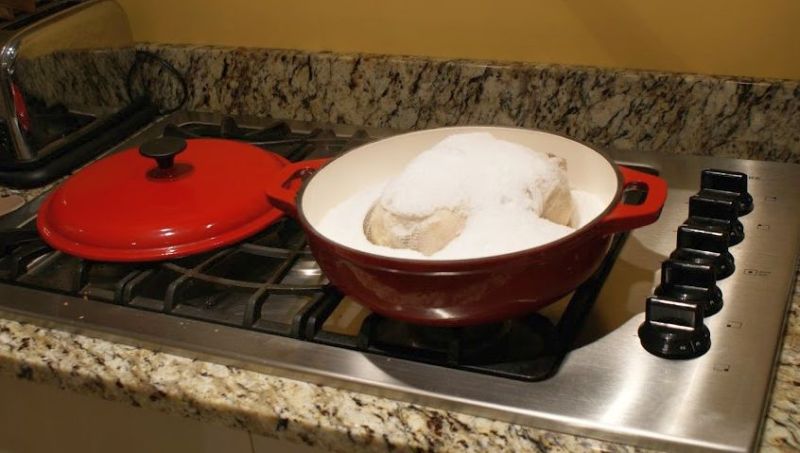
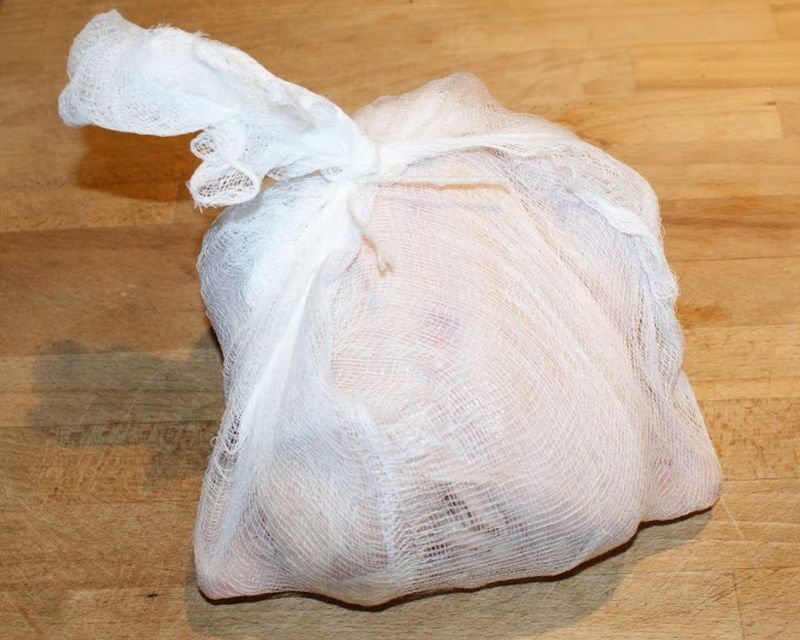
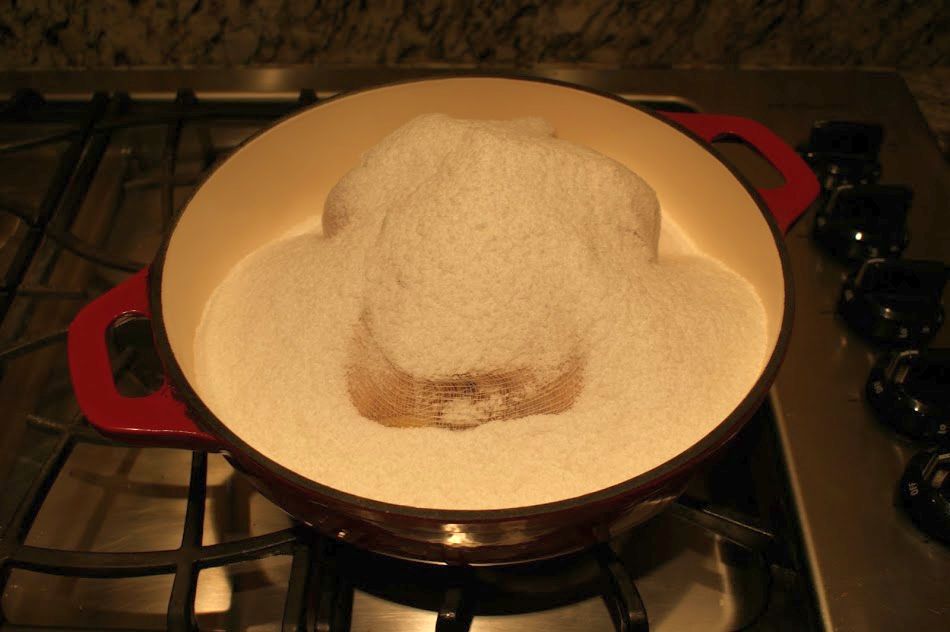

I won’t be making this but I completely enjoyed sharing your journey. Thanks.
Hi Mary and Mike! So glad you wrote about this. I otherwise may have lost the initiative to try it myself after you mentioned it a few weeks ago. I never would forget the odd style of cooking you’ve unearthed, however. Cover the whole dang thing in salt! I look forward to trying this out, but I’ll make sure to double the ginger sauce.